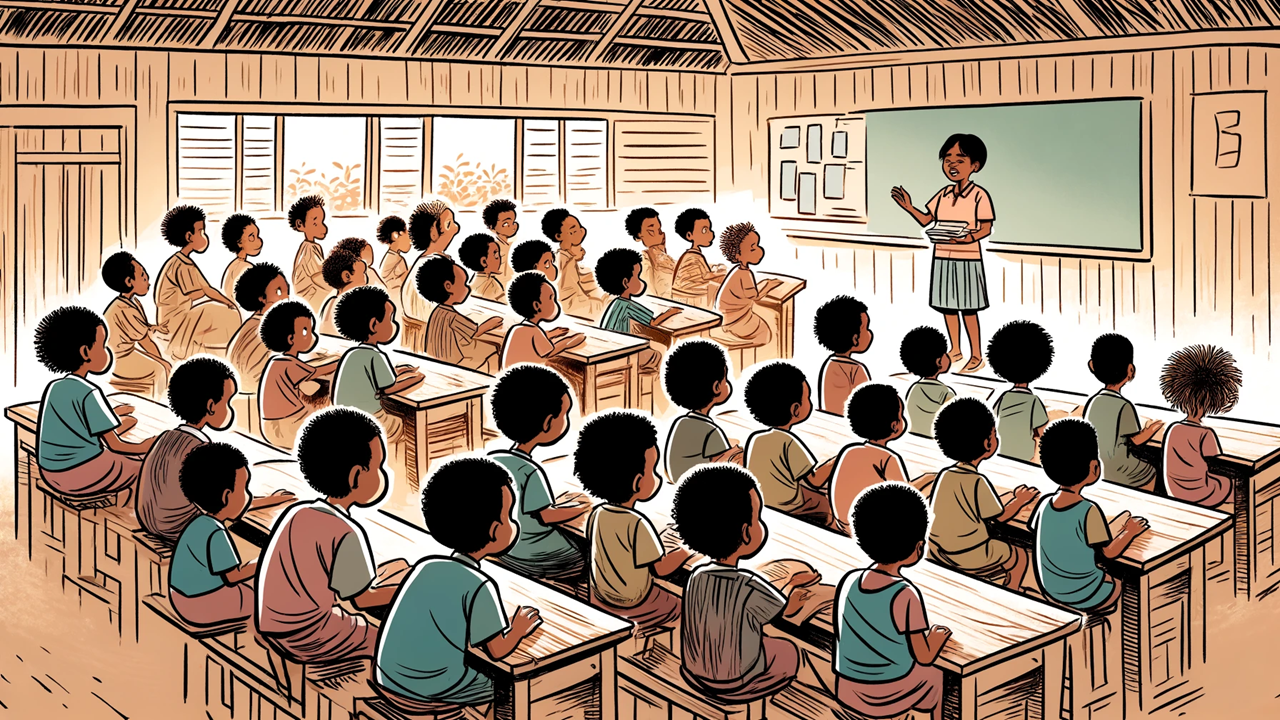Investing in the Future: How Papua New Guinea is Prioritizing Children's Education for Sustainable Growth
Papua New Guinea's recent economic update reveals moderate growth and a pressing need for educational reforms. The report, "Papua New Guinea Economic Update: Invest in Your Children," underscores the country's progress and challenges, highlighting the importance of investing in children's education to secure a prosperous future.

Papua New Guinea's economy has shown resilience, bouncing back to pre-pandemic levels. However, the road to sustained growth and development remains rocky, marked by a series of economic challenges and social issues. The recently released "Papua New Guinea Economic Update: Invest in Your Children" by the World Bank underscores the nation's progress, and current economic status, and highlights the critical need for educational investment to secure a prosperous future.
Economic Overview: A Mixed Bag of Growth and Challenges
The PNG economy has made significant strides, recovering to its pre-COVID-19 level. Nevertheless, the growth rate has decelerated to 2.7% in 2023, down from a robust 5.2% in 2022. This slowdown can be attributed to a combination of reduced global demand and domestic supply constraints. The extractive sector, including mining and LNG production, has faced setbacks, while the non-resource sector has shown moderate growth fueled by government spending and agricultural advancements.
The government’s fiscal consolidation efforts have yielded positive results. The budget deficit has been halved to 4.4% of GDP in 2023 from a pandemic high of 8.8% in 2020. This reduction is largely due to increased revenue collection from non-tax sources and stringent fiscal policies aimed at stabilizing public debt. However, the public debt remains high, posing a continued risk of debt distress, necessitating cautious financial management and conservative financing strategies.
Inflation in PNG saw a significant decline to 2.3% in 2023, primarily due to lower food and education costs. The central bank's move towards greater exchange rate flexibility has gradually depreciated the kina, improving the country's external competitiveness. The current account surplus has also improved, driven by a trade surplus and a decline in the financial account deficit. Export growth in agricultural products like cocoa and copra oil has helped offset the decline in mineral exports.
Educational Crisis: A Barrier to Long-Term Growth
While the economic indicators provide a mixed outlook, the report highlights a pressing issue that could impede long-term growth: the educational crisis. Many children in PNG are exiting the school system without basic literacy and numeracy skills, which severely limits their future employment opportunities and economic mobility. The report identifies several underlying challenges contributing to this crisis.
High rates of stunting significantly impact children's brain development, leading to long-term cognitive deficits. This issue is compounded by poor school readiness, as many children start school late and are not adequately prepared, which hampers their ability to learn effectively. The inadequacy of learning outcomes is further evidenced by a significant gap in basic literacy and numeracy skills among students. This gap is exacerbated by a lack of essential school inputs, such as materials and infrastructure, as well as poorly trained teachers and weak education system management. Additionally, funding inequities plague the education sector, which is chronically underfunded, resulting in resources being inequitably distributed and leaving the most disadvantaged regions with the least support.
Recommendations for Educational Reform
To address these challenges, the report makes several key recommendations aimed at transforming PNG’s education system.
Reducing stunting requires investing in maternal and child health services, ensuring that every child is fully immunized, and has access to adequate nutrition to support their overall development. Improving school readiness involves expanding access to early childhood education (ECE) and providing subsidies for disadvantaged children, which will help ensure that children start school at the right age and are prepared to learn. Enhancing the learning environment can be achieved by providing schools with sufficient materials and infrastructure, improving teacher training, and adopting educational technologies to significantly improve learning outcomes. Strengthening education system management involves reforming the education management information system to ensure timely and reliable data, increasing budgetary allocations, and ensuring equitable distribution of funds, all of which are essential steps to fortify the education sector.
A Vision for the Future
The report envisions a transformed education system by 2050, where three-fourths of PNG’s youth will have completed secondary or tertiary education. This ambitious goal aims to equip the youth with the necessary skills and knowledge to become the driving force behind PNG’s future economic growth and development. Achieving this vision will require sustained efforts and aligned actions from all stakeholders, including government leaders, education authorities, teachers, and parents.
The "Papua New Guinea Economic Update: Invest in Your Children" report comprehensively analyzes PNG’s current economic situation and highlights the urgent need for educational reform. While the economy shows signs of recovery and resilience, the long-term growth prospects hinge on addressing the fundamental issues in the education sector. Investing in children’s education is a moral imperative and a strategic economic priority that can unlock PNG's full potential and drive sustainable development.










